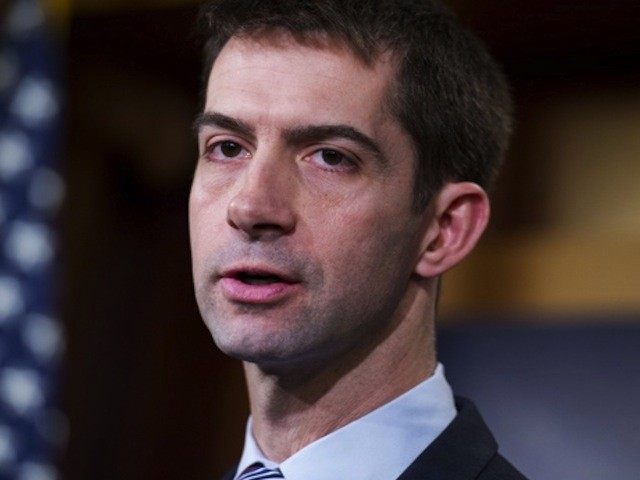U.S. Senator Tom Cotton (R-AR) said Wednesday evening that opponents of the nuclear deal with Iran will be able to muster the veto-proof majority necessary to override President Barack Obama’s expected veto when Congress votes to reject the agreement.
“I believe that we can get a veto-proof majority,” he told Breitbart News. “Yesterday [Tuesday] was the best day that his deal will have. And I don’t believe it was a very good day.” He said that in addition to a handful of Democrats who already opposed the deal, others are expressing misgivings.
Still, Cotton and his allies face an uphill fight–or, at the very least, a tough one. The handful already in favor of the deal includes intelligence committee veteran Sen. Dianne Feinstein (D-CA). The Times of Israel reports that the Obama administration is already “exerting all the force of 1600 Pennsylvania Avenue on a handful of legislators expected to determine the fate of an agreement over 18 months in the making.” The White House’s efforts are focused on a few Democrats whose support or opposition to the deal will lead others to follow.
Because Republicans are thought to be unanimous in opposition to the deal, the deal’s opponents will need to convince at least 13 Senators and 43 Representatives to join their Republican colleagues–a very tough task in a deeply divided Congress. But Cotton believes the issue will transcend party loyalty, unlike Obamacare, because the consequences of a bad deal cannot be undone.
“Those who vote for the Iran deal are putting their political fortunes in the hands of the ayatollahs,” he says. “If Iran goes nuclear, the American people are going to want to know who was responsible for this deal. This vote is unlike almost any other vote. A vote for this Iran nuclear agreement will never be in the past.”
Supporters of the deal counter that if it fails, the result will be war. In a press conference Wednesday, President Obama warned: “Without a deal, the international sanctions regime will unravel with little ability to reimpose them….Without a deal, we risk even more war in the Middle East and other countries in the region would feel compelled to pursue their own nuclear programs, threatening a nuclear arms race in the most volatile region in the world.”
He also accused critics of the deal, including Israeli Prime Minister Benjamin Netanyahu, of failing to propose an alternative. Israel disagreed: “We have consistently laid out an alternative, which is a better deal that actually blocks Iran’s path to the bomb and links the lifting of restrictions on Iran to tangible changes in Iranian behavior,” an official told the Times of Israel.
Cotton also rejects Obama’s claims about sanctions, arguing that Europe wanted to maintain sanctions while Obama sought to unravel them. “America was the weakest link in these negotiations. The socialist government of France was drawing the toughest line.” He added that the “snap-back sanctions” Obama promised in the event of Iranian violations would not work, and that it was better to maintain existing ones. U.S. sanctions alone, Cotton said, would still be effective, since 50% of global financial transactions involve the U.S. in some way.
As for war, Cotton told Breitbart News that the “military option” that might be needed as a last resort would not look like the Iraq War, but like smaller operations, such as President Bill Clinton’s Operation Desert Fox against Iraq, or the NATO bombing campaign over Kosovo. He suggested that Obama was leading the public, inaccurately, to fear a military operation that is well within American capabilities to execute.
Earlier this year, Cotton was the lone Senate vote against the Iran Nuclear Agreement Review Act, which provides for both houses of Congress to review the Iran deal, because it lowered the threshold for approving the deal from the Constitution’s two-thirds majority in the Senate to an effective one-third minority in both houses. Still, Cotton seems confident, partly because the deal’s details are so problematic.
Cotton will have some powerful political allies in his effort to defeat the deal. On a conference call Wednesday, the leaders of the American Israel Public Affairs Committee (AIPAC) announced that they would fight the deal “with the entirety of our institutional resources.” They will be assisted by Christians United for Israel (CUFI), which opposed the deal at its 10th annual conference in Washington this week.
Still, some of AIPAC’s traditional political allies–such as Vice President Joe Biden–will be fighting hard on the other side of the lobbying effort.
Asked whether there was some chance, as Obama claims, that the Iranian regime might shift in a moderate direction as a result of the deal, Cotton–a combat veteran of the Iraq and Afghanistan conflicts–scoffed.
“I do not believe the ayatollahs will ever change their behavior. Their foundational belief is to confront the United States. I do not think that rewarding them for years of duplicity will change that.”
He noted that the incoming chair of the Joint Chiefs of Staff, Marine Corps General Joseph Dunford, had told Congress that Iran was responsible for killing 500 U.S. troops in Iraq through its terrorist proxies.
“Nine years ago, Iran was trying to kill me and my soldiers in Iraq,” Cotton told Breitbart News, arguing that nine years from today, when parts of the Iran deal had expired, little will have changed.

COMMENTS
Please let us know if you're having issues with commenting.